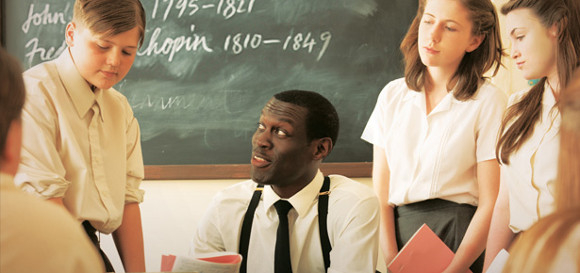To Sir, With Love (Northampton)
Matthew Kelly and Ansu Kabia star in a new version of the classic Sidney Poitier film at the Royal & Derngate theatre

E R Braithwaite’s 1959 novel recorded his experiences as a well-educated, over-qualified and idealistic teacher in the East End of London and was filmed in 1967 with Sidney Poitier as the Guyanese “Ricky” Braithwaite – a black sheep led to slaughter – countering casual racism, ingrained hostility to art and dead-end misery.
Now, Ayub Khan Din has written a stark and engaging stage version, co-produced by the Royal & Derngate and the Touring Consortium, that both preserves the ironic clash of the original – black teacher tames white savages – and creates a poetic period piece in which the “high” cultural touchstones are Keats’s “La belle dame sans merci,” Kipling’s “If” and a school outing to the Victoria and Albert Museum (“We don’t go to places like that” is the initial objection).
In the growing canon of important school plays, this one’s not too dissimilar to Alan Bennett’s The History Boys, though Barrie Reckord‘s Skyvers is much closer in mood to Braithwaite’s evocation of what used to be known as a “sink” school in the old Inner London Education Authority.
Perhaps Braithwaite makes too much of a plaster saint of himself, but he’s particularly good at conveying the dowdiness and tarnished optimism of the staff room, where Paul Kemp’s cynically ignorant, pipe-smoking Mr Weston and Peta Cornish’s demure Gillian are equally affected by the new arrival.
Ansu Kabia as Ricky – the actor’s left arm is in a sling after a bicycle accident – presents an unflinching portrait of interventionist decency, a solid rock buffeted by the kids’ cheek, high spirits and desk lid banging impropriety. And he’s paired with a snowy-haired, avuncular Matthew Kelly as the progressive headmaster, Florian, who encourages the children to write their own reports.
Mark Babych‘s fine production, with movement by Nick Winston (the teenage pupils are a well-drilled ensemble) and a clever design by Mike Britton of translucent chalk boards, a brick and chimney sky-line and a battery of desks and chairs, both evokes the period and transcends it with a sort of knowing edginess.
This is the depressed, immediately post-war London whose spirit was only partly lifted by the 1948 Olympics, so it’s odd to hear Lady Chatterley’s Lover referenced (the furore over the unexpurgated version erupted ten years later), and sometimes the cuteness of the pouting, stroppy kids suggests the Isle of Dogs only bred puppies.
But this doesn’t detract from the central thrust of the play’s argument, which is that young lives are transformed by good teachers and cultural enthusiasm, something we’re in danger of losing in today’s enfeebled political and public discourse about the benefits of education. And Ricky learns something, too, about the rituals and loyalties of a lost life in the East End.












